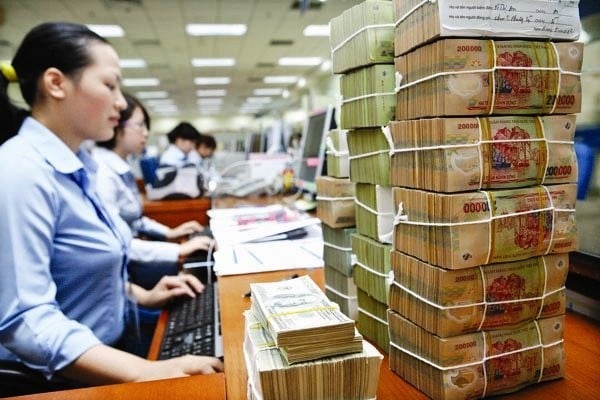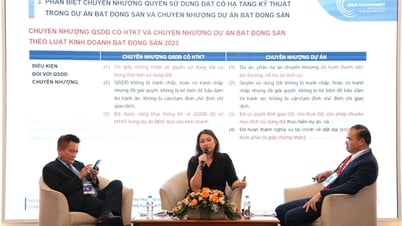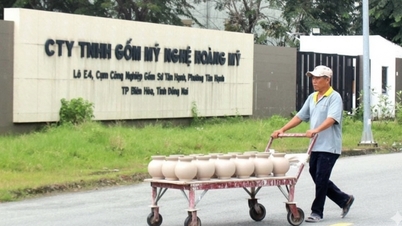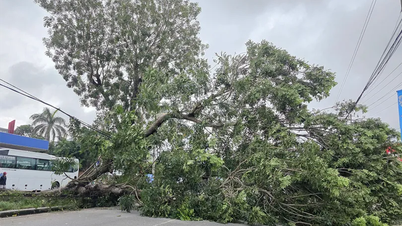Measures applied in the world
According to VARS, regulating the real estate market by credit policies and laws is one of the effective ways to ensure the sustainable and stable development of the market, avoiding destabilizing impacts on the economy . Or more negatively, the boom or recession of the real estate market can lead to major financial crises.
Historically, real estate has often been listed as one of the main reasons for Vietnam's economic difficulties, due to the direct impacts of this industry and indirectly due to the impact of supporting economic sectors affected by this important sector such as construction, tourism , finance - banking. Factors that can be mentioned include bad debt, high real estate inventory, difficulties in capital mobilization and loss of investor confidence.
The above difficulties not only directly affect the development of the market but also cause widespread consequences for the entire economy. Therefore, on the basis of maximum respect for the natural laws of supply and demand, it is extremely necessary for the State to proactively strengthen the regulation of the real estate market when the market shows "signs of instability". This is also a measure applied by the Government and financial agencies of many countries in the world.

Regulating the real estate market is an important measure to avoid negative impacts on the economy.
Specifically, to ensure the sustainable and stable development of the real estate market, avoiding destabilizing impacts on the economy, the Government of many countries has used credit policy as a tool to regulate the real estate market. Through tightening or loosening credit, the Government can control real estate prices, prevent bubbles, and ensure market stability. However, the flexibility in this policy depends on each market and the specific economic situation of each country. The experience of some countries on this issue is as follows:
For example, in China, to control the flow of investment capital, the Chinese government imposed many restrictions on the purchase of real estate using credit, especially loans for speculation. They also controlled the flow of capital abroad to prevent speculative money from pouring into foreign real estate markets.
Specifically, in 2010, the real estate market in China developed rapidly, housing prices increased rapidly. At that time, tens of millions of apartments in China had been built for a long time but had no one living in them. This situation lasted so long and was so serious that at the end of 2017, the Chinese government had to issue a policy of "houses are for living, not for speculation", and at the same time directed the establishment of a policy system to control and regulate the market, in order to distinguish speculators from home buyers with real housing needs.
In addition to the very strict regulations on owning a second home or more, such as requiring buyers of a second home to put down a deposit of 60-85%, and a third home up to 100%; requiring anyone buying a home to hold the property for at least three and a half years; firing high-ranking officials in localities that have allowed home prices to skyrocket; and even applying reference pricing measures, distributing purchase quotas... In addition, many Chinese cities have also used a series of measures such as capping home loan credit, raising interest rates on home loans and tightening mortgage regulations. These adjustments have been somewhat effective, significantly reducing speculation.

Many regulations "hit the pockets" of home buyers are applied to avoid speculation.
In Singapore, in order to control speculation and prevent a real estate bubble, the Singaporean government has increased the minimum deposit rate when borrowing to buy real estate, especially for second or third home buyers. At the same time, to reduce the loan amount and control real estate prices, the government has also limited the loan tenure combined with a tight credit policy.
In Canada, the government has tightened regulations on loan-to-value ratios to limit high-risk loans. Homebuyers in major cities like Toronto and Vancouver often have to put down higher deposits when borrowing to buy real estate. Many countries also apply credit control measures to foreign real estate buyers to limit speculation, curb rising house prices and protect middle-income people in major cities like Australia, Canada, etc.
Experience from other countries shows that credit policy is one of the important tools for governments to regulate the real estate market. Many of the policies that have been successfully applied in other countries can be completely referenced, learned, and applied in Vietnam.
Need to apply to Vietnam to regulate the market
With the effectiveness achieved in many countries around the world, VARS proposes a number of solutions on credit policy to regulate the market when the market fluctuates up or down by more than 20% in 3 months or the real estate market has other fluctuations that affect socio-economic stability without affecting people's demand for housing as follows:
First, tighten credit policies for speculators. To reduce the number of people borrowing money for speculative purposes or using too much leverage, credit institutions can adjust loan limits by adjusting loan-to-value ratios, requiring higher equity payments, or applying higher interest rates to second home buyers or more.
Second is to strengthen credit monitoring and management. The government can impose regulations on credit quality control, requiring banks to report more details on real estate-related loans, thereby strengthening risk monitoring. Establish a credit mechanism for social housing projects, prioritizing funding for social housing development projects, affordable housing, to address the housing needs of low-income people.

VARS proposes many measures to regulate the market in the most reasonable way.
In addition, the State also needs to have a policy of loosening credit, including reducing interest rates and supporting long-term loans with preferential interest rates for first-time home buyers, or some other priority groups for the purpose of social stability such as newly married young couples,...
However, according to VARS, in order to apply the policy "correctly and accurately", the State needs to build a database system that is large enough, accurate enough and highly updated to ensure a clear distinction between real home buyers, using it for real production and business purposes, and speculators and profiteers. It is extremely necessary to speed up the announcement of the real estate transaction price index and some influencing indicators to have a basis for determining when the State needs to intervene.
In particular, in the context of real estate prices being a concern as at present. To regulate the real estate market more comprehensively, credit policies should be combined with the application of real estate transfer tax or property tax. At the same time, the application of regulatory policies must be flexible, ensuring the stability of the real estate market and minimizing risks.
Source: https://www.congluan.vn/de-xuat-dieu-tiet-thi-truong-bang-cac-chinh-sach-phap-luat-tin-dung-post314332.html




![[Photo] General Secretary To Lam receives Slovakian Deputy Prime Minister and Minister of Defense Robert Kalinak](https://vphoto.vietnam.vn/thumb/1200x675/vietnam/resource/IMAGE/2025/11/18/1763467091441_a1-bnd-8261-6981-jpg.webp)
![[Photo] Prime Minister Pham Minh Chinh and his wife meet the Vietnamese community in Algeria](https://vphoto.vietnam.vn/thumb/1200x675/vietnam/resource/IMAGE/2025/11/19/1763510299099_1763510015166-jpg.webp)















































































































Comment (0)